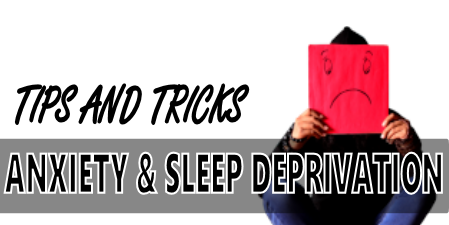Mattresses

Anxiety and Sleep Deprivation
If you are experiencing anxiety and sleep deprivation, you are not alone. Anxiety and sleep deprivation often occur simultaneously. Sometimes anxiety increases sleeplessness. Insomnia – or lack of sleep – can also lead to anxiety. So, ultimately if you have one, the other may not be far behind. The Journal of Psychiatric Research concluded after studying nearly 15,000 subjects that anxiety and sleep deprivation are closely related. Sometimes the anxiety came first, other times it came after. In more than 38% of the cases, both symptoms began at about the same time.
I have anxiety and sleep deprivation issues, what can I do?
First of all, both anxiety and sleep deprivation are medical concerns. They can be a symptom associated with an underlying health condition. They can also be a side effect of medications – prescription or over-the-counter. Even if they aren’t part of a larger mental health issue, anxiety and sleep deprivation can be worrisome. So, seek help from a health professional before they get worse is your best bet.
Increase Activity Levels During the Day
Some activities naturally lessen anxiety. Your doctor may recommend at home treatment options. Exercise, for example, gets the blood flowing throughout your body. Brain chemistry changes with exercise, which has a good impact on anxiety and sleep deprivation. By releasing feel good endorphins, exercise helps you feel less stress and anxiety. Exercise works two-fold because by burning energy, you may become tired and find it easier to sleep at night. This is one solution for sufferers of anxiety and sleep deprivation. Just be careful to get your exercise earlier in the day. Working out too close to bedtime might make it harder to sleep.
Practice Good Sleep Hygiene
Once your sleep schedule is off track you may end up taking more naps during the day. Getting sleep is important, so if you cannot sleep during the day, it makes sense to snooze a little whenever you can. However, sooner or later taking daytime naps will catch up to you. Then you will have an even harder time getting to sleep at night. It is better sleep hygiene to skip the napping. Other nighttime habits and practices might help you sleep better at night, and hopefully lesson your anxiety too. Before bed, eliminate electronic usage and replace that habit with a warm bath instead.
Skip the Joe and the Jack
Caffeine and alcohol no only interrupt sleep, they can also increase anxiety. Alcohol is a depressant, a mood-altering substance. Drinking can lead to anxiety, irritability and depression. Alcohol can also interfere with the effectiveness of medications. According to the Anxiety and Depression Association of America 15 million adults in the US suffer from social anxiety. About 20% of those also have an alcohol abuse or dependence issue. Nervousness and agitation from a pattern of over caffeination can result in anxiety and sleep deprivation. Caffeine can also hinder your hunger causing an unbalanced diet. Having a healthy diet is one way that you can work towards less anxiety and sleep deprivation. Aim to consume a variety of colorful produce and protein sources. Different color fruits and vegetables contain differing nutrients. A balanced diet will help you obtain the vitamins and minerals you need for optimal health.
Frame of Mind and the Big Picture
Negative thinking can snowball into anxiety and sleep deprivation. Sometimes people stay up late worrying or beating themselves up for any lack of success throughout the day. Did you know that optimism can be learned? Practice is essential when it comes to re-training your mind. Replace negative thinking by practicing self-love. Forgive your mistakes and praise your successes. In the heat of the moment, you can turn an anxiety ridden circumstances around too. Breathing exercises have been proven to help. Now there are many helpful Apps you can download right to your phone. Breathe2Relax, developed by the National Center for Telehealth and Technology is just one that is available. Apps like these can help you calm down so that you can step back and logically approach the situation.
Distract Anxiety and Sleep Deprivation Might Be Resolved
Those who find themselves bogged down by anxiety can become less involved in school and recreational activities. Involvement in the community can keep you busy and engaged. Distractions can take your mind off the worry and nervousness you feel. Furthermore, social interactions can boost your confidence and boost your mood. Additionally, when people stay active throughout the day, they often times sleep better at night.
[/rrsimplebox]
© 2025 Rest Right Mattress. All Rights Reserved.


